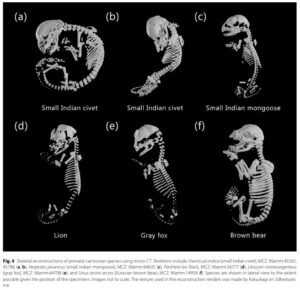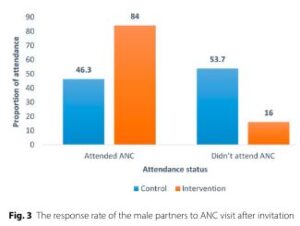
BMC Zoology – Lions & sea lions & bears, oh my: utilizing museum specimens to study the ossification sequence of carnivoran taxa

The study of skeletal development in mammalian species is difficult due to the technical and ethical challenges of collecting embryonic material. Fortunately, natural history museums contain broad collections that often include prenatal specimens.
In this paper, the authors took advantage of one such museum collection to study ossification (bone formation) in 15 specimens from six species of mammalian carnivores: sea lion, mongoose, lion, fox, bear, and civet. They used micro-computed tomography (micro-CT) to non-invasively evaluate the extent of bone formation in each specimen and were able to determine the order of ossification in these species.
The authors found that most of the species conformed to known ossification sequences of either canine or feline clades of carnivores, but that the sequence for sea lions diverged. They suggest that sea lion’s aquatic environment has affected prenatal development to differ from land mammals’.
You can read more about the authors’ inspiration and process in a Behind the Paper post on Springer Nature Research Communities.
BMC Infectious Diseases – Modelling the impact of hybrid immunity on future COVID-19 epidemic waves

Prediction of future COVID-19 waves is crucial to support decision-making regarding vaccine allocation and public health policy. However, many of the models used do not take into account effects of both vaccination and prior infections.
To address these shortcomings, the authors of this paper created predictive models that consider how combinations of vaccination and prior Omicron infection will protect populations from near-future outbreaks of the Omicron variant of COVID-19. They also considered population age demographics and the context of public health measures to reduce infection (or lack thereof).
They found that a variety of factors, including demography, health systems capacity, and vaccine efficacy, had critical effects on the benefits of vaccination and past infection in outbreak prevention. Understanding the interplay between these factors will be useful for tailoring outbreak prevention efforts.
BMC Palliative Care – Assisted dying: principles, possibilities, and practicalities. An English physician’s perspective

Twycross presents three different models of assisted dying legal in different countries with different requirements for patient eligibility. He then presents a ‘least worse’ model with minimal physician involvement. Importantly, palliative-hospice care should not be involved, as some patient may decline to use such care for fear of overuse of drugs.
BMC Public Health – Association of daily sitting time and coffee consumption with the risk of all-cause and cardiovascular disease mortality among US adults

Prolonged sitting is known to be associated with numerous negative health outcomes, including cancer and cardiovascular disease (CVD), and mortality. Coffee, on the other hand, has been shown to be associated with reduced mortality. How these two common factors interact and balance is not known.
In this paper, the authors studied the joint associations of daily sitting time and coffee intake with mortality from all-cause and CVD in nationally representative sample from the United States of America. Data on daily sitting time and coffee consumption for over ten thousand adults were included.
As expected, the authors found that longer sitting time and higher coffee consumption had opposite associations with mortality. Interestingly, the joint analysis showed that the association between higher sitting time and increased mortality was only present among adults who didn’t drink coffee, indicating a possible protective effect of coffee consumption.
BMC Pregnancy and Childbirth – Efficacy of mobile phone intervention to increase male partner antenatal care attendance for HIV testing in Moshi municipal, Tanzania: a randomized controlled trial

Male partner involvement in antenatal care (ANC) is known to improve maternal outcomes as well as provide opportunities for HIV testing and counselling for men who might not otherwise have healthcare system contact. Generally, pregnant women invite their partners to attend ANC and HIV testing, but uptake is low.
In this paper, the authors report the results of a randomized controlled trial that used a mobile phone intervention and clinic staff invitations to partners of women who attended ANC alone. Outcomes included male partner attendance at later ANC visits and utilization of HIV testing of male partners after the invitation.
The results showed that mobile phone invitations from clinic staff had a positive effect on both male partner ANC attendance and male partner HIV testing. This is a promising strategy to enhance male partner involvement in maternal care and improve health outcomes.
This paper is part of a recent Collection, Quality improvement in maternal and reproductive health services.
Comments